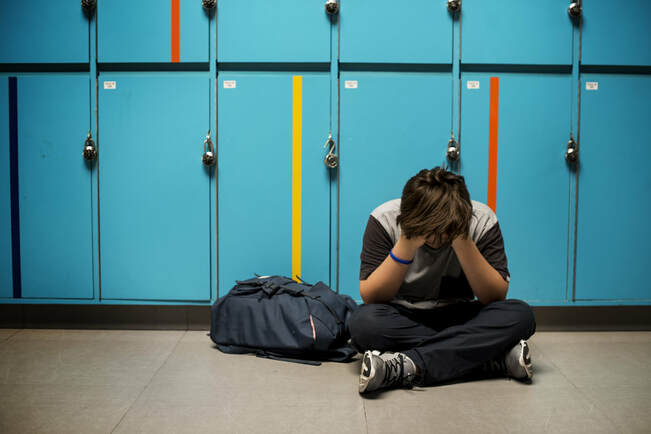|
Bullying is a common problem for students of all ages. The explosion of social media has raised the stakes, however, as much bullying has moved from the school hallways into the online world.
Ideally, parents can keep tabs on their students' school experiences and social media use. But, as any parent knows, children and teens are not always forthcoming about negative experiences with classmates. If left unaddressed, bullying can lead to low self esteem, low grades, and even depression and anxiety. It's essential that parents recognize the warning signs and work with schools to keep their students safe. Are you familiar with the warning signs of bullying and cyberbullying? Here are some red flags: Apathy If your student loses interest in schoolwork or other activities, this does not necessarily signal a lack of motivation. Students who are bullied may have trouble concentrating on schoolwork because of anxiety or low self-esteem. If a student doesn't feel safe and accepted at school, it's challenging to care about report cards and due dates. If your child's disinterest in schoolwork is out of character, it may be a sign of social problems at school. Frequent Illness Children who are bullied often complain of frequent headaches or stomachaches. These maladies may be real symptoms of stress, or they may be excuses to avoid school or other activities where bullying occurs. Regardless of the reason, frequent sickness is a red flag. If your child is avoiding school, it's important to figure out why. If your child is experiencing physical symptoms of anxiety, it's best to treat the underlying cause. Changes in Eating or Sleeping Habits Bullying can affect a child's appetite and sleep. If your child did not eat at school -- because his lunch was stolen or because he avoided the cafeteria -- he may come home famished. If he is anxious, he may struggle to finish his meals. Likewise, bullying can affect a student's sleep. For some, anxiety may cause nightmares or insomnia. For others, depression may cause a lack of energy or disinterest in daytime activities. Keep an eye on your student's eating and sleeping habits and note any pronounced changes. Isolation There's nothing wrong with being an introvert. But if your child doesn't make friends, avoids social scenarios, or suddenly becomes a loner, this could be a sign of bullying. Children who struggle to make friends are often the targets of bullying. Not everyone will be a social butterfly, but it's important for your child to have a support system at school. Sometimes, social isolation is self-imposed. Other times, former friends exclude a child who's being bullied. Either way, a sudden loss of friendships could stem from a problem with bullying. Acting Out Bad behavior at home can signal social problems at school. If your normally friendly child is behaving aggressively or lashing out at family members, it may be because she's being bullied. Bullying makes its victims feel powerless. When your child is at home, she's around people who love her unconditionally. So, she may feel tempted to mistreat siblings or parents to regain a feeling of power and control. Bullying is a cycle. If your child shows characteristics of a bully at home, talk to her teacher and find out if she's experiencing it (or perpetrating it) at school. How Should I Talk to My Child? Many students don't tell parents when they are being bullied. This could be because they don't want parents to worry, they feel like the bullying is their fault, they're ashamed to be the target of bullying, or they're afraid of hurting their reputation by getting adults involved. Rather than ask your child directly if he's being bullied, talk to him about his life at school, including people he likes and dislikes. If he trusts you to listen and sympathize, he is more likely to open up. Additionally, your child may fear you will respond to the bullying in a way that further damages his standing with classmates. (Remember the old adage, "No one likes a tattletale.") Make sure you communicate to your child that you will work with him to address the bullying. If you're concerned that your child is being bullied, here are some good conversation-starters:
If you're concerned that your child is being bullied, set an in-person meeting with her teacher. The teacher will be the most informed about how your child interacts with other students. Ask how your students gets along with classmates, whether she has close friends, and if the teacher has seen any students mistreat your child. Before your meeting, research different types of bullying so you can offer examples. If you feel that your meeting was not helpful or sufficient, schedule a meeting with the school's guidance counselor or principal. If your student is being bullied because of race, national origin, gender, sexuality, disability or religion, the school is obligated to address this issue and protect your student. If the school's response is inadequate, contact your superintendent or the state department of education. Bullying can have serious, long-term effects on a student's mental health and achievement. If you suspect your child is being bullied, take action as soon as possible. If your child has fallen behind in school or has trouble completing assignments, iLearn Academy can help. Call us at 847-834-0791.
0 Comments
Leave a Reply. |
Categories |
We make a personal commitment to ensure each student is well-prepared for the academic school year.
Dedicated to helping your student succeed.
©
iLearn Academy 2019


 RSS Feed
RSS Feed
